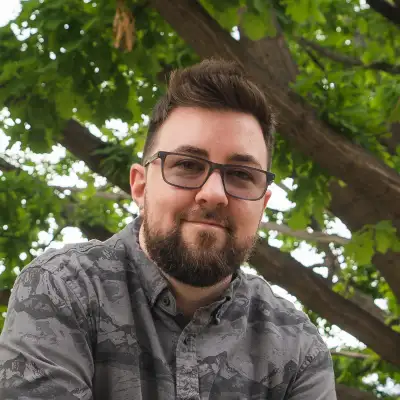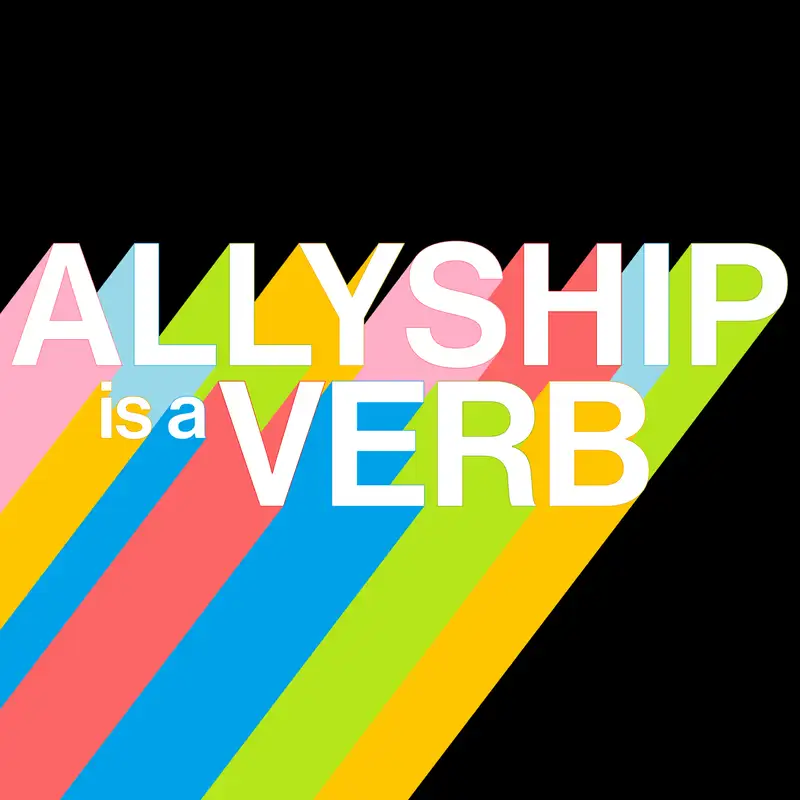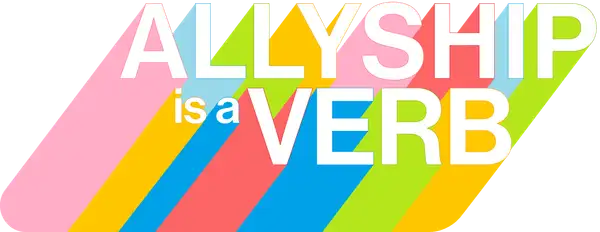Sorry Not Sorry: When Apologies Fall Flat for Queer Folks (And 3 Tools to Fix It)
[00:00:17] Chris Angel Murphy: Welcome to Allyship is a Verb, the LGBTQ+ podcast that explores and humanizes practicing allyship for the LGBTQ+ community and beyond. I’m the host, Chris Angel, and my pronouns are they/them. Each episode will either be a guest conversation or a mini-episode to dive deeper into the allyship tip that was shared in the previous episode, including any resources for further learning.
[00:00:43] So today, let’s talk about Shane’s tip.
[00:00:50] Hey folks! Quick shout-out at the top: I wanted to take a moment to thank my dear friend, Kaitlyn, for becoming a monthly supporter. So, thank you, Kaitlyn! [laughs] I really appreciate it. Trying not to shout into the mic… but, um. If any of you out there are considering becoming a monthly supporter, I’d really appreciate it.
[00:01:11] And it just helps me to make sure that I can produce the best podcast possible. So, thank you so much and you may get a shoutout in a future episode. As a reminder, last week we met Shane.
[00:01:26] Shane Whalley: Hey folks, I’m Shane Whalley and my pronouns are ze, hir, and hirs.
[00:01:31] Chris Angel Murphy: Today’s mini-episode will be diving a bit deeper into Shane’s allyship tip from last week.
[00:01:36] So, if you haven’t already given that a listen, please do. However, this is also meant to be an episode that can stand on its own, so it’s also ok if you haven’t listened to it. The conversation gave me a lot to ponder. I am so grateful for our elders in the LGBTQ+ community. I think about what our elders have experienced, who they’ve been able to meet, and the work they’ve done to pave the way.
[00:02:04] There were so many gems throughout our talk and I wanted to focus on hir tip because there’s 3 tools I think will be helpful for y’all to be able to apply it. What's one allyship tip you'd like for everyone listening to consider?
[00:02:22] Shane Whalley: For me, recovery is the most important thing. I think being a good ally is
[00:02:29] the willingness to be uncomfortable. If you make a mistake, I'm a big believer that I would love for someone- I've been trying to start a hashtag. Yeah, 60-year-old people can start hashtags.
[00:02:42] Chris Angel Murphy: Yes, you can.
[00:02:43] Shane Whalley: That's right. #AcknowledgeandApologize and then ask if there's anything needed for repair and then do better.
[00:02:52] Right. And so for me, we're always going to make mistakes. We're always going to make mistakes. But, what we do once we do them is again, for me, is where our greatest learning happens and it's where our greatest healing happens.
[00:03:10] Chris Angel Murphy: Now, we all make mistakes. It can be humbling to acknowledge them. You can probably think of some recent news headlines where the following applies.
[00:03:19] When a person or community tells you that you’ve made a mistake or what you did caused harm, take a moment to listen. Sometimes we are quick to react or respond. Instead, really take the time to be present and if there are those who are willing to be in a hard conversation with you, have that conversation. Not with the purpose of defending one’s ego, but to truly listen and take in the feedback.
[00:03:47] It can be hard. It can be crunchy. There are beliefs and views I’ve held that have been harmful, hurtful, and problematic. There are still things I’m unlearning today. However, sometimes, people may double down on the problematic behaviors or actions when they’re called out or called in. That’s why today, there are three tools I’d love to talk through with you.
[00:04:11] Two I share all of the time, and one is a tool that is new to me. I’ll be linking to two of them in the full episode transcription on allyshipisaverb.com, so be sure to check out the episode page to get the resources. So, let’s talk through these tools and let me do my best to weave these together. The first tool is this idea of Oops, Ouch, I’m Sorry.
[00:04:37] I learned this tool from LGBTQ+ community when I was doing community organizing in Los Angeles several years ago. Now, [laughs] I don’t expect folks to go around saying “Oops, ouch, I’m sorry" to folks. Rather, it’s a framework for recognizing oops - I’ve made a mistake. Ouch, this probably hurt someone. I’m sorry
[00:04:59] being a genuine apology. Now, this is a tool I’ve been sharing a LOT lately - especially if you’ve taken my pronouns course. It’s the work of Dr. Harriet Lerner: the nine essential ingredients of a true apology. I imagine most of you listening, at some point in your life, have been on the receiving end of a performative apology. So, I think it’s worth exploring because I personally have messed up the act of giving a genuine apology.
[00:05:35] Since these are fairly short, so I’ll read them aloud now and offer some thoughts after some of the 9 ingredients for clarity. Number one: does not include the word "but." When I hear the word “but”, it makes me think that either number one, the first thing that you're saying to me before the but is null and void, and/or the second thing you're telling me is actually what you mean to say.
[00:06:02] So either way, it just doesn't work out. The second ingredient is keeps the focus on your actions and not on the other person's response. One way I think of this is saying something like, “I'm sorry, you feel that way.” Ehh, ah, mmm, no, [laughs] no. You could say something like, “I am so sorry that I misgendered you.” Right?
[00:06:33] You're being specific about an action or a behavior that had happened. And it's not because you're trying to paint yourself to be this bad person, it's really just sometimes these behaviors or actions that we take that aren't great. And we just need to apologize for them and do better in the future. Number three.
[00:06:52] Includes an offer of reparation or restitution that fits the situation. Well, let's say that you broke a glass that was your friend’s while you were at their home. You can offer to replace it. But, I think what's really key here, is making sure to ask the person, “can I do this?” So you might say something like, “I am so sorry that I broke this glass.
[00:07:17] I didn't mean to, can I buy you another one?” Again, consent is so important here because maybe someone doesn't want another one. What if it held significant value? I mean, there's so many ways we could pick this apart, but all of it's going to come back to please do check in with that person and see how they feel about the offering.
[00:07:38] Number four: does not overdo. Oof- this has been an interesting one. I know that at times when people misgender me by accident, all of a sudden this monologue comes out as if it's their acting debut and I'm not here for it [laughs]. So, you don't need to draw a lot of attention to it. You don't need to go on a whole big, long monologue.
[00:08:01] You really should just be as concise and as to the point as possible. So don't overdo it. Number five. Doesn't get caught up in who's more to blame or who started it. If you feel an inclination to head that way, maybe you're not ready to give the apology. I think this can especially come up in relationships, right
[00:08:22] So maybe instead, just recognize, “You know what, I'm going to need a moment and I'd like to revisit this conversation, but I'm going to need some time to cool off for now before I can have this talk again.” Something like that. Number six requires that you do your best to avoid a repeat performance. Here's the thing: if we've already been talking and you've been continuing to misgender me week-after-week and you apologize week-after-week, your apology is going to start being meaningless to me because I don't see that you're doing the work to stop the problem in the first place.
[00:09:00] So if you're not making any progress toward it, consider where the blocker is for you, and maybe don't apologize. Number seven: should not serve to silence. How I take this is you're trying to shut someone down. Maybe they are really upset and talking at a great length about how much this particular thing has hurt them and you're using it as a way to silence them.
[00:09:29] That's not okay. Again, you want the apology to be sincere. You want it to be genuine. You don't want it to be because you’re trying to shut someone down and just hurry up and move on and get through it. Number eight: shouldn't be offered to make you feel better if it risks making the hurt party feel worse.
[00:09:53] I think this one can be tricky because it requires you to have empathy and tap into that person’s essence and try to imagine what it might be like from their perspective. If this is something that was done to them that happened decades ago, that could be digging up really painful past memories that the person doesn't need to revisit.
[00:10:13] However, sometimes people can also find great healing from this. So, I think going back to a tool that we've already learned, asking for consent around, “Hey, can I talk to you about this? I would like to apologize about a specific thing,” and go from there. It's possible the person may not want to hear from you, but I think with this one, it's pretty important to try to check and see if you can have that conversation or not before you start going into an apology.
[00:10:46] If you're not really sure or if there isn't a great way of doing that, then you can also try talking with people that you know and trust to see what they think. Get some feedback and try to make the best decision that you can regarding this one. Number nine: does not ask the hurt party to do anything.
[00:11:06] Not even to forgive. An interesting way this came up is that there was a health professional who misgendered me and her apology started with, “I'm so sorry, and I don't expect you to ever forgive me.” Now, I know she wasn't trying to get me to say that I forgive her but it was kind of weird. It did make me feel uncomfortable.
[00:11:28] It did make me feel like I maybe had to say that then- there did feel like some- some pressure there. I don't think that was the person's intention. So don't put that- don't put the onus on the person they're going to need the time that they need to heal and that's just going to have to be okay. Or maybe instead, you need to focus on forgiving yourself instead of seeking that forgiveness from that person.
[00:11:53] These are some big tools! It's a lot to talk through and it's a lot to digest, though I am really excited to talk through this last tool that I would love to share. This last tool is one that is newer to me. It's a repair model I learned from a blog post by Rhodes Perry. There are actions and examples.
[00:12:14] There are five actions total, so let's work through those now. The first one is asking for consent. You might say something like, “Can you help me understand how I caused harm?” Now, this is tricky because we don't want to put the emotional labor on the person that we hurt. If it was a conversation between the two of you and you're really genuinely not sure what went wrong on your end, then you can ask if they'd be willing to share.
[00:12:44] Maybe it was something in your tone, maybe it was a word choice, and it's possible if someone else was there that they may be able to give you some insight, too. So just be open to a no and respect the no. The second action is to actively listen. This means listening without planning a response or getting defensive.
[00:13:06] If you're not in a place to genuinely listen and be present with what's being said, then don't go down this road. See if you can table the conversation for later and do some self-soothing techniques so that you can take whatever emotional charge is going through you so that you can be better able to listen.
[00:13:28] The next one is acknowledging the harm that was done. So, you might say something like, “Chris Angel, I am so sorry for the harm I caused by misgendering you.” Again, what's good about this is that you're being very specific about the action. Now, the next step is asking for clarification. If someone's willing to be in that hard conversation with you, especially if it was the person you directly hurt, repeat back what you listened to and ask, “Did I get it right?"
[00:14:04] Right? That can also be known as mirroring or paraphrasing. So, you might say something like, “Chris Angel, what I'm hearing is that you are upset with me because I continue to call you Chris instead of Chris Angel and that I continue to use he/him pronouns instead of they/them/theirs for you. And in the future, you want me to self-correct in the moment when I catch myself, and then continue talking.
[00:14:36] Did I get that right?" That's a great example. The last part is to be accountable. The last example I just gave actually helps us a lot with this one. So when we want to be accountable, that means we're going to list what we are going to do or change to avoid repeating the harm. I kind of already said it in the last example, so I'm not going to say it again, but that's where things are with this one.
[00:15:04] So, those are the 3 tools that I wanted to talk through with you. And again, as a recap, that's the Oops, Ouch, I'm Sorry framework, the nine essential ingredients of a true apology, and the repair model. I genuinely believe that these 3 tools work together very well because my hope is that you will feel more confident in your next steps if and when you make a mistake.
[00:15:31] Those oops moments can be rough, especially if we're not catching ourselves. And while changed behavior is a wonderful apology, may these serve as a roadmap to getting there and hopefully avoiding harm or oops moments in the future. Here are some journaling prompts or questions for you to ponder, if you feel up for it.
[00:15:56] 1. Have I been on the receiving end of a performative apology? How did that feel for me? What do I wish that person did differently? 2. Have I caused harm recently? Have I held myself accountable? Did I offer a genuine apology? 3. Have I been told at some point that I caused harm?
[00:16:25] How did I respond or react to this information? Is there anything that I could have done differently? 4. What can I do to self-soothe if someone doesn’t forgive me? How can I take care of myself? Can I forgive myself? How can I move forward without that person's forgiveness? A quick note here to say that forgiveness isn’t the goal nor should it be expected.
[00:16:55] 5. How can I hold myself accountable for any changes I need to make? What are support systems I have in place, such as a therapist or coach? Well, folks, that’s it for this episode. Thank you for listening and I’m curious to know if you’ve heard about any of these tools before, if you’re going to adopt them into your life, and anything else you want to share about this episode or the previous episode.
[00:17:25] As a reminder, our next episode will be with another guest, so make sure that you follow on Spotify or Google or where you listen to podcasts so that you can catch that next episode. Visit AllyshipIsAVerb.com for any resources and a full transcript of the episode. You can also follow @GenderSexualityInfo on Instagram.
[00:17:51] Thank you for practicing allyship with me. Please consider following and sharing this episode with someone else.
Creators and Guests



